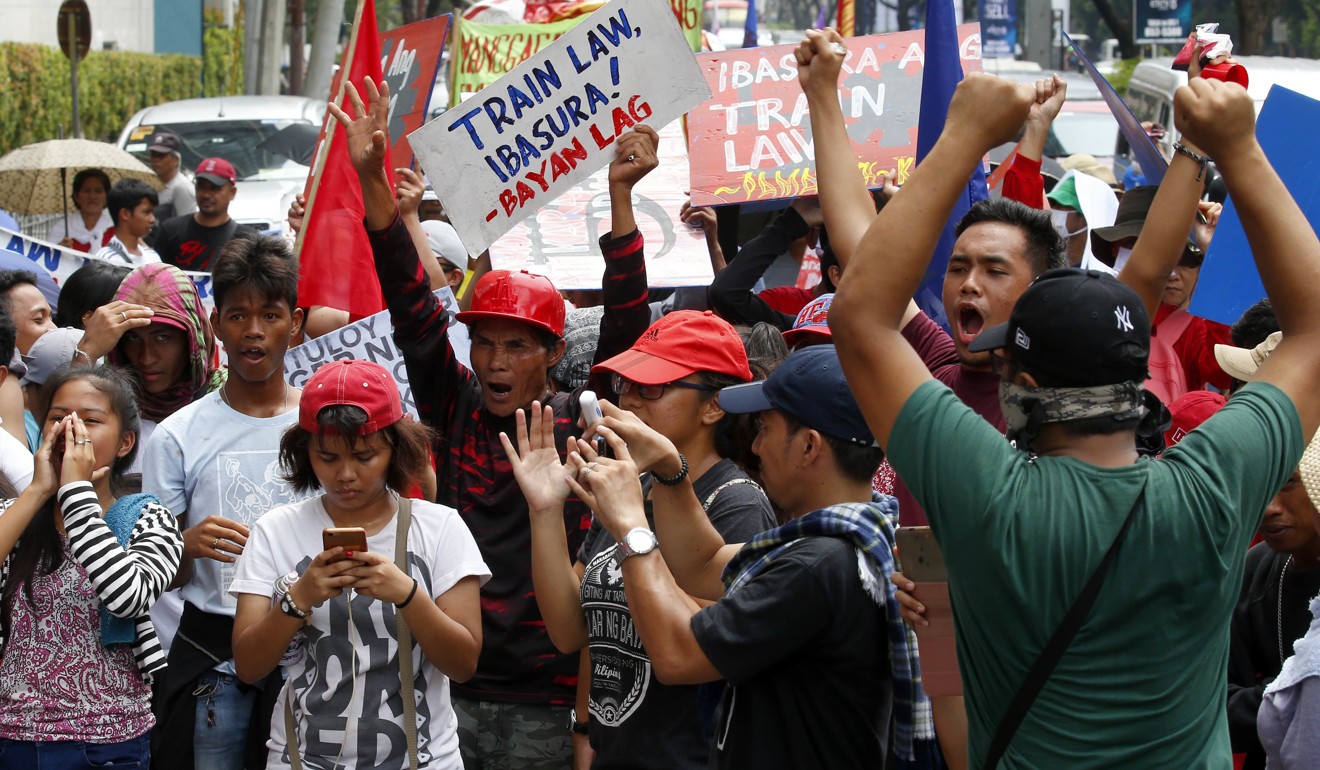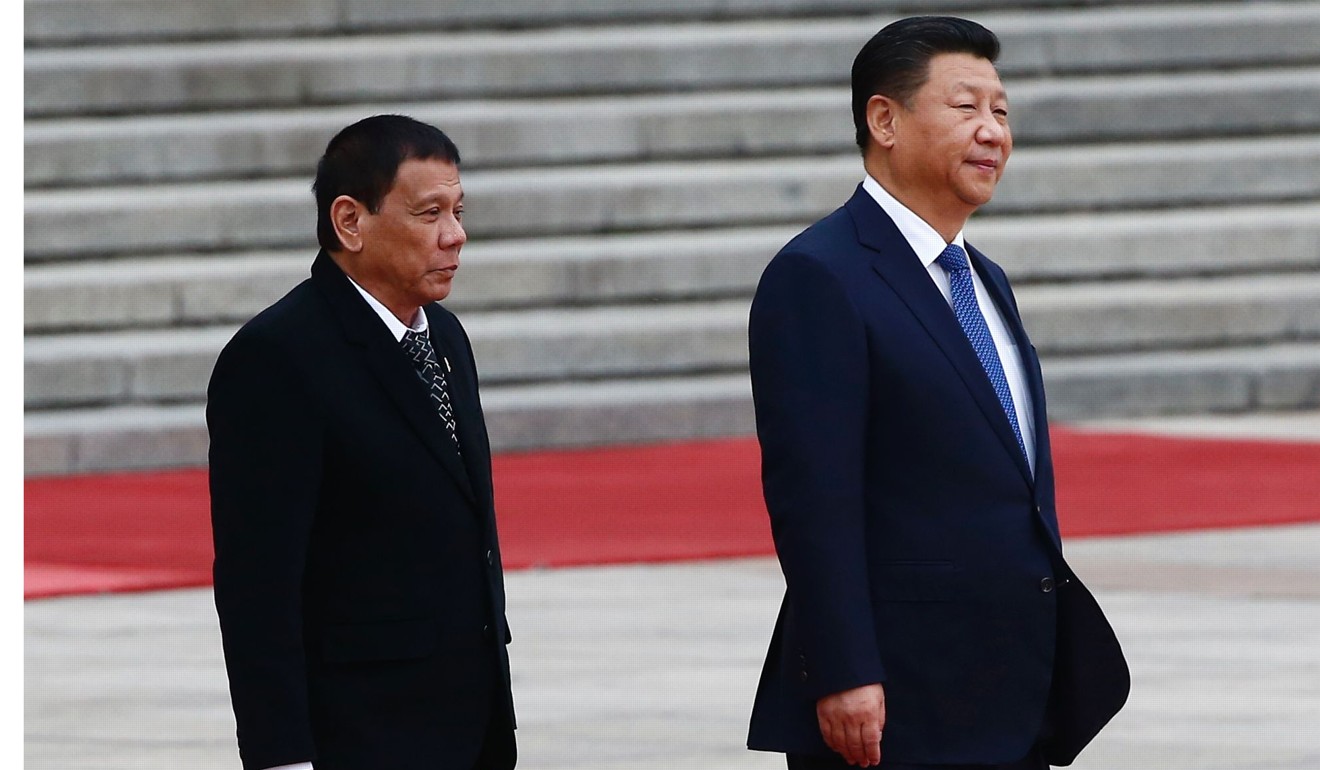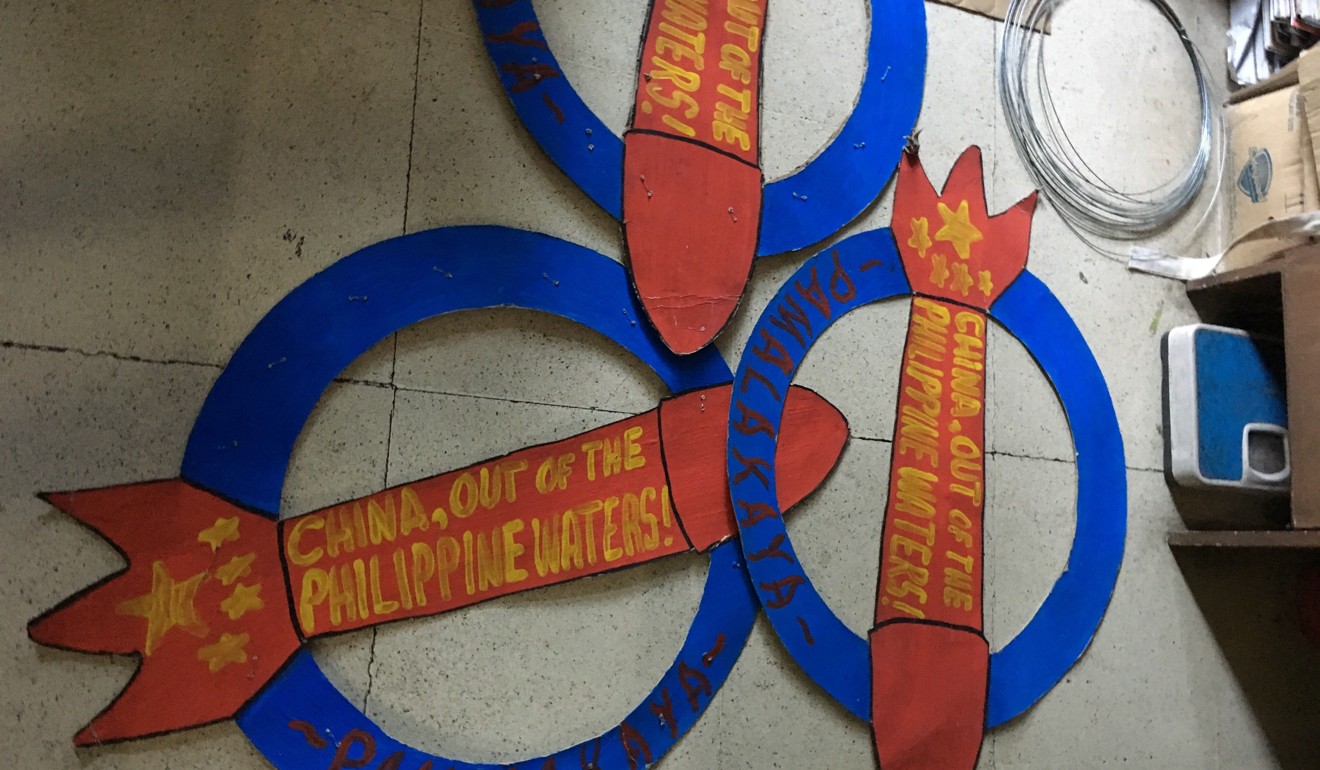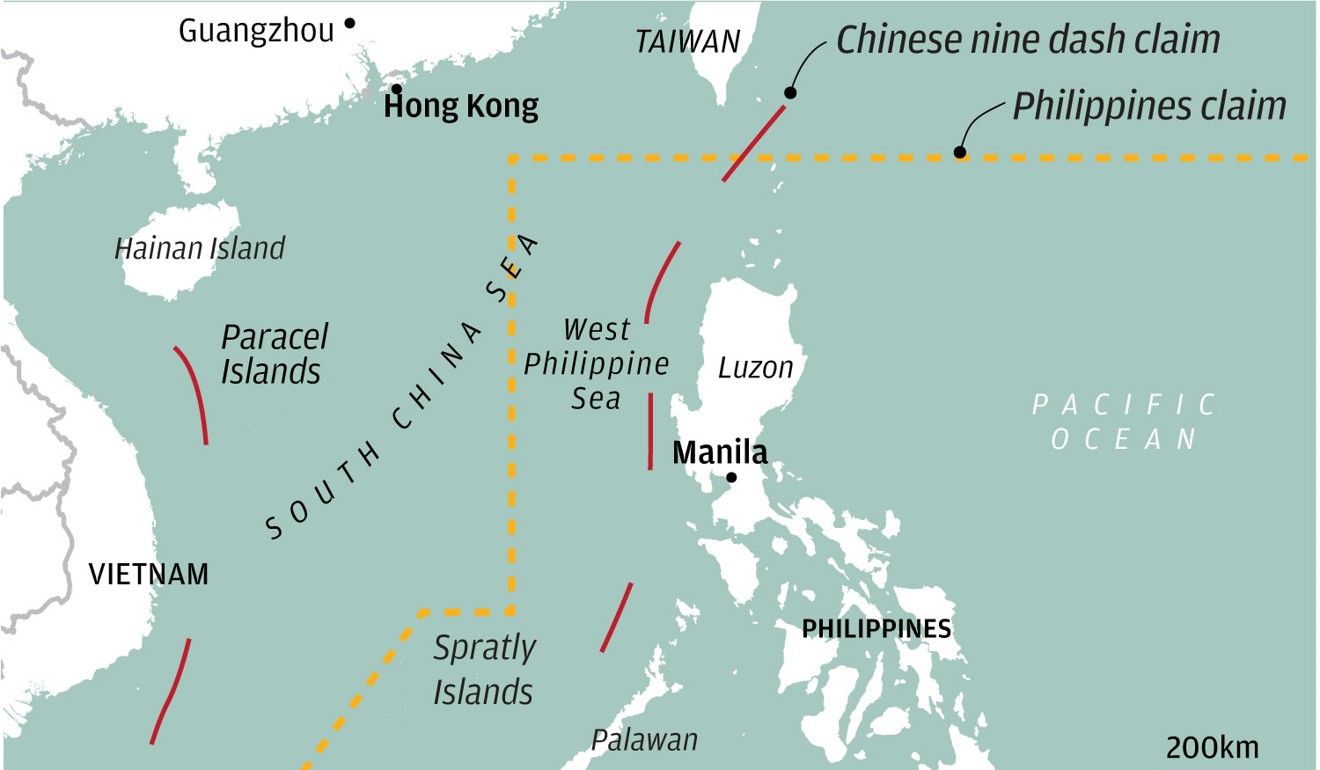
Xi Jinping's Manila visit: South China Sea dispute and Chinese investment deals expected to spark protests
- Despite a thaw in relations under Rodrigo Duterte, Beijing’s stance on South China Sea is expected to spark protests during Chinese president’s visit
- Two sides expected to announce major infrastructure deals which have raised concerns over environmental impact
In a dimly lit building in Quezon City, a woman was hunched over the ground working on several brightly painted protest signs, in preparation for Chinese president Xi Jinping’s first state visit to the Philippines this week.
Scattered in front of her in the office of the militant fisherfolk group Pamalakaya-Pilipinas, which represents over 100,00 fisherfolk, were paper rockets painted with the Chinese flag, encircled by a blue ring, bearing an all-caps message: “China, out of the Philippine waters!”
“There is nothing left for us to do, but to fight,” the group’s chairman Fernando Hicap, a lifelong fisherman, said steelily from the room next door.
Pamalakaya will be one of several groups mobilising ahead of Xi’s upcoming visit to the country on Tuesday and Wednesday next week.
Activists have been incensed by discussions over a joint oil and gas exploration deal in the disputed the South China Sea and are wary that the lure of high-profile investment projects will see the Philippine claim to the waters put on the back burner.
Xi’s two-day trip may see a framework agreement for a joint development deal off the coast of Palawan announced, as well as the expected big-ticket Chinese investment and loan deals under President Rodrigo Duterte’s “Build, Build, Build” programme.

These are expected to include a new railway line, the Chico-River Pump Irrigation project and Kaliwa Dam.
As the first state visit by a Chinese head of state since 2005, the visit is expected to further cement an economics-driven rapprochement under Duterte, who has previously expressed his “love” and gratitude for Xi.
“We have every reason to believe that this visit will enormously boost China-Philippine relations in the new era,” China’s ambassador to Manila Zhao Jianhua wrote on Thursday in an article sent to media.
‘Power napper’ Duterte skips Apec dinner, photo call of shiny shirts
“Standing at a new and crucial historical juncture, China and the Philippines are bound to build stronger strategic mutual trust, perform deeper economic cooperation and trade and nurture closer people-to-people exchanges.”
But politicians and activists have raised concerns over the prospect of a joint development deal in waters that Manila officially terms the West Philippine Sea, which they fear would validate Chinese claims in the waters.
The issue is a historically prickly one, with Duterte’s predecessor Benigno Aquino leading the charge to take China to the international courts after a 2012 stand-off at the Scarborough Shoal, which both countries claim.

In 2016, the international tribunal ruled in favour of the Philippines, finding no legal basis for Beijing’s “nine-dash line” claims in the South China Sea, which cover over 80 per cent of the resource-rich waters.
Despite the ruling, Beijing has grown more assertive in the disputed waters in recent years, and has built and militarised artificial islands in the areas it claims.
Speaking on the sidelines of a regional summit in Singapore on Thursday, Duterte said that China was “already in possession” of the South China Sea, so it was not wise to “create frictions” by holding military drills in the area.
Former solicitor-general Florin Hilbay, who worked for the Philippines on the arbitration case, told a forum earlier in the week that a joint development deal would undermine the tribunal’s ruling and may violate the Philippine national constitution.
China Telecom’s move into Philippines faces legal battle
“Instead of getting a formal waiver from the Philippine government, I think what the Chinese government is trying to do is to find an implied waiver of that decision.
“The best way to get a waiver is by entering into kind of an agreement, the assumption of which is that China still has continued rights over the West Philippine Sea,” Hilbay, who is standing for election to the senate, said.
He said any joint deal “has to be a purely economic relationship”, adding: “We need to understand the details of the economic agreement, so that it is compliant with our constitutional standards and our legal standards.
“What we’re trying to avoid is a sovereign-to-sovereign agreement, or a sovereign partnership couched as an economic agreement.”

China’s foreign ministry said that Beijing was“looking forward” to working with Manila to push forward the joint energy exploration deal for the benefit of both countries, and provide an example for regional cooperation.
“Joint development happened before the United Nations Convention on the Law of the Sea provisional demarcations, and will not impact the position of both countries sovereignty, sovereign rights, and jurisdiction,” a spokesperson said in a statement.
“China’s position on the so-called South China Sea arbitration case has been consistent and clear; it has not and will never change.”
Earlier this week Philippine Budget Secretary Benjamin Diokno highlighted concerns about the slow implementation of a US$9 billion official development assistance programme Duterte secured during a trip to Beijing in 2016 but saying Xi’s visit would “put pressure on the speed of implementation”
Among the major project loans to be signed at a ceremony on Tuesday afternoon is the agreement for the New Centennial Water Source Kaliwa Dam, a 18.7 billion pesos (US$354,430) project intended to provide greater water security for Metro Manila.

Metropolitan Waterworks and Sewerage System administrator Reynaldo Velasco said negotiations with China had yielded better conditions for the Philippines, including lower interest rates and an agreement to not use exclusively Chinese resources for the project.
“It has to be a give and take – you need it, and they finance it, so there are considerations you have to accept,” he said on Thursday. “It doesn’t mean that it’s like you are surrendering everything, like you are being too overly friendly to China.”
While there has been domestic opposition to the dam over the relocation of indigenous communities and environmental risks Velasco said that the project is “a done deal”.
Xi’s visit next week is expected to spark protests, both from opponents of Chinese infrastructure projects in the country, and groups angered by Beijing’s stance on the South China Sea.
Is Xi’s Manila trip the start of a golden age for China, Philippines?
Leon Dulce, national coordinator for the environmental group Kalikasan People’s Network for the Environment, said thousands were expected to take to the streets next week to protest and even “hound” the Chinese president.
“It’s almost as if the silence of the Duterte administration is being seen as a go-signal for Beijing to just ignore the accountabilities that they should be giving to the Philippines insofar as damage [to] the West Philippine Sea is concerned,” he said.
“Our goal is to push China not only to demilitarise and get out of the West Philippine Sea, but also to ecologically restore the damage to the destroyed coral reefs and shoals.”
Hicap, the chairperson of Pamalakaya, said the group would march against joint oil exploration because any potential deal will not benefit the Filipino people.
“It would prohibit Philippines fisherfolk from fishing in their traditional fishing grounds,” he said. “If you stop fisherfolk from fishing, they will die.”

